Paul
Robeson (1898-1976)
An extraordinary man, from
an extraordinary background
by Marsha Prescod
Paul Leroy Bustill Robeson
was a giant figure of the 20th century. He was the
son of a slave in
the United States of America - William Drew Robeson
- who escaped from bondage at 15 and went on to
become a college graduate and a minister. Paul
Robeson took that legacy to the next level.
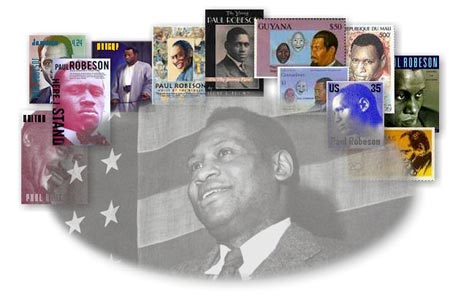 He won a scholarship to a top US university, (and
was the only black student during his time there)
and distinguished himself both academically and
in football, baseball, basketball and track at
national level. He graduated in 1919.Then he went
to law school, (paying for it by working as an
athlete and performer) qualified as a lawyer, and
joined an all white firm. He won a scholarship to a top US university, (and
was the only black student during his time there)
and distinguished himself both academically and
in football, baseball, basketball and track at
national level. He graduated in 1919.Then he went
to law school, (paying for it by working as an
athlete and performer) qualified as a lawyer, and
joined an all white firm.
This was at a time when segregation was at its
height, the Klu Klux Klan were in their pomp, lynching
was a fact of life in the southern states, and
black people in many parts of the US were without
the vote. The chances for African-Americans to
become professionals were few.
If he had accomplished no more than that, Paul
Robeson would have been extraordinary.
But in addition, he had a special gift. A baritone
voice of such beauty and depth that he became internationally
famous in theatre, records and films because of
it. He appeared on stage in the 1920s,having joined
a theatre company which had the legendary playwright
Eugene O’Neill as an associate director.
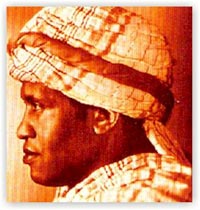 His career as an actor was so successful he appeared
on Broadway, and the London stage, doing Shakespeare
and other roles- his Othello first appeared on
the English stage in 1930 (American theatres couldn’t
countenance a black man in the role until a decade
later). He went into films in the 30s and 40s and
became the first international black male film
star, despite the extremely limited (and usually
demeaning) roles for black actors. The musical,
Show Boat in which he appeared in both theatre
and film versions, became a classic, his singing
Ol’ Man River in it the highlight. His career as an actor was so successful he appeared
on Broadway, and the London stage, doing Shakespeare
and other roles- his Othello first appeared on
the English stage in 1930 (American theatres couldn’t
countenance a black man in the role until a decade
later). He went into films in the 30s and 40s and
became the first international black male film
star, despite the extremely limited (and usually
demeaning) roles for black actors. The musical,
Show Boat in which he appeared in both theatre
and film versions, became a classic, his singing
Ol’ Man River in it the highlight.
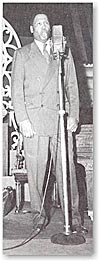 He became a recording star in the 1930s, made recordings
of Negro spirituals that are still selling and
being broadcast today. And he had a social conscience
and interest in the rights of not just his own
people but of the poor and oppressed. He could
have rested secure in the niche he had carved
out for himself, and not challenged the status
quo. He became a recording star in the 1930s, made recordings
of Negro spirituals that are still selling and
being broadcast today. And he had a social conscience
and interest in the rights of not just his own
people but of the poor and oppressed. He could
have rested secure in the niche he had carved
out for himself, and not challenged the status
quo.
Robeson became a lifelong political activist,
campaigning to end lynching, for workers rights,
against colonialism in places such as India, Africa
and the Caribbean and for socialist causes. He
spoke at rallies, conferences etc and gave performances
in support of and to raise money for a wide range
of causes- including striking miners in Wales.
He lived in Britain during the 1930s, and again
for a while in the 1950s, meeting many African
students here who were later to become leaders
of their countries. His visits to and campaigning
for Wales is still remembered and as recently
as 2001 an exhibition about him was mounted in
Cardiff, and in 2003 the National Library of
Wales did a special exhibition on him.
He visited the Soviet Union in 1949 and was impressed
by what seemed to him to be a lack of racism compared
to the US. His socialism and support for the Soviet
Union meant that after World War ll -despite
his support for the Allies during the war, and
an award from the US government-that same US government
viewed him as subversive. A long period of persecution
began.
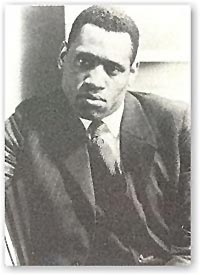 He had been under FBI surveillance since
1941, but after his criticism of America’s approach
to the USSR during a peace conference in 1949 his
civil rights advocacy and left wing views made
him a target. His passport was confiscated by the
government to prevent him travelling abroad. He
tried to give a concert in Canada-where US citizens
didn’t need a passport to travel-and was
prevented. He had to stand in the back of a truck
on the US/Canadian border whilst 20,000 Canadians
on the other side listened to him sing. He had been under FBI surveillance since
1941, but after his criticism of America’s approach
to the USSR during a peace conference in 1949 his
civil rights advocacy and left wing views made
him a target. His passport was confiscated by the
government to prevent him travelling abroad. He
tried to give a concert in Canada-where US citizens
didn’t need a passport to travel-and was
prevented. He had to stand in the back of a truck
on the US/Canadian border whilst 20,000 Canadians
on the other side listened to him sing.
Those attending his concerts in the US could be
physically attacked - in one incident some ended
up in hospital - and local law officers would deliberately
fail to protect them. Leading figures in the growing
civil rights movement of the 1950s made sure to
distance it from him. He was under investigation
as to whether he was a communist.
He was summoned before the much feared House Committee on Un-American Activities
(HUAC), an organisation which destroyed the careers of those in the entertainment
industry who were communists or communist sympathisers. Bravely, he refused
to comply with their demands and denounced America’s system of racial
injustice. This pitted him against the American government. Russia/the Soviet
Union was no longer seen as an ally like during the war, but a threat to
western civilization, as the ‘Cold War’ came to dominate international
relations for the next four decades.
Robeson was an advocate for the Soviet Union
and there is controversy surrounding that,
as his support coincided with the period when
Joseph Stalin was in charge,
and years later revealed to have imprisoned, executed and persecuted millions.
Some critics of Robeson still see him as an apologist for a brutal regime.
Others say most socialists outside Russia supported it, unaware of the atrocities
being committed, and Robeson was no different.
It has been pointed out that Robeson believed
in the ideas that fuelled the Russian revolution,
and its very real achievements, and that was greater
than the actions of one man and his government.
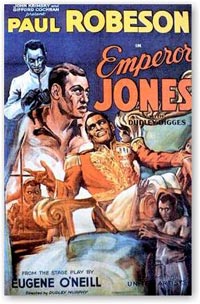 Robeson’s politics and his insistence on
being a proud, articulate black advocate of liberty
for people of colour and working peoples, destroyed
his career. Broadway, Hollywood, radio and record
companies no longer welcomed Robeson, and he was
unable to do commercial concerts until the late
1950s. The US government made it clear in officials’ meetings
with him, that he was banned from travelling so
he couldn’t speak up abroad about the treatment
of black people in the US. Robeson’s politics and his insistence on
being a proud, articulate black advocate of liberty
for people of colour and working peoples, destroyed
his career. Broadway, Hollywood, radio and record
companies no longer welcomed Robeson, and he was
unable to do commercial concerts until the late
1950s. The US government made it clear in officials’ meetings
with him, that he was banned from travelling so
he couldn’t speak up abroad about the treatment
of black people in the US.
For years he was effectively silenced at home
and abroad.There were campaigns in various countries
in support of Robeson, such as the Let Paul Robeson
Sing! Campaign in Wales. It took a Supreme Court
decision in 1958 for him to get his passport back,
where after he was able to tour in countries such
as Australia, New Zealand, England and parts of
Europe.
Years of government harassment took their
toll on this gifted man-who could speak 20 languages,
and who in a less racist era would have been
a diplomat, or world leader. He was considered
as
a US Vice Presidential candidate by a political
party in 1948. Yet by 1961 he had a nervous breakdown,
which his son was later to insist was triggered
by a CIA operative drugging his drink. He attempted
suicide.
For the rest of his life he battled against depression,
had more than one further breakdown and his public
appearances limited. He remained isolated from
the growing black political movements the US
of the 1950s and 60s, which should have seen
him as an honoured forerunner of their struggle,
because of his socialist views.
Only the SNCC (Student Non-Violent Co-ordinating
Committee) acknowledged him, declaring themselves
his spiritual children at a gala held in his honour
on his 67th birthday. It is fitting that his last
public appearance was at a benefit dinner for them
in 1966.
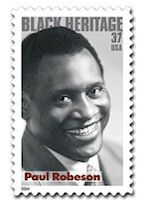
Paul Robeson died at age 77. Since his
death he has ironically been honoured by diverse
countries
and institutions. Both in the US - he has received
a Grammy Award, been indicted into a football hall
of fame, been placed on postage stamps, had schools,
community centres, university buildings and theatres
named after him. And internationally. The UN amongst
other institutions, honoured him in 1978.
In Britain last month, 20th September, a memorial
was unveiled in London at the university’s
School of Oriental and African studies (where Robeson
studied for a while) in his memory by a group headed
by the former government minister Tony Benn, to
whom Robeson remains an inspiration and a personal
hero. Benn was a member of the British campaign
supporting Robeson in the 1950s, and met him at
the Houses of Parliament when he was eventually
able to travel. As Benn told the BBC:
"He was one of the greatest figures
of the past century. He stood for everything
I believed
in"
Paul Robeson Photos and History
at Bay
Area Paul Robeson Centennial Committee
All photos on this page courtesy of the above.
|




